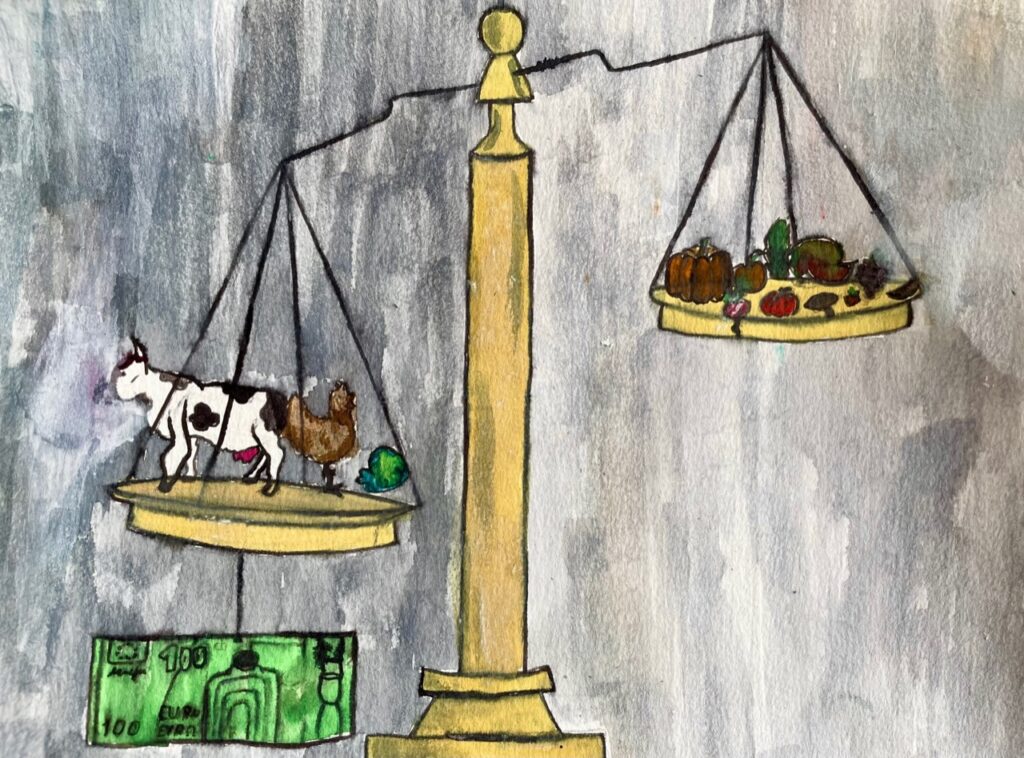By Maeve Bouchez
Edited by Eléonore Andre
When overhearing debates about vegetarianism and veganism amongst those who do consume meat, fish, and poultry, the usual outcome is never in favour of these plant-based diets. Common arguments include their small marginal impact, their impracticality, their increased risk for nutrient deficiency, and most of all, their expense. But are they really that costly?
Many distinct factors contribute to pricing a food product, such as weather, disease, global demand, energy costs, government policies, geopolitical conflicts, where it is produced, where it is sold, etc. The list goes on. In our current uncertain times of inflation, you never really know what food prices are going to look like, especially for cereals. What is clear, however, is that animal products are more expensive.
According to a study carried out by The Lancet, which aimed to investigate the costs of omnivore, flexitarian, pescetarian, vegetarian, meat was found to account for the biggest proportion of costs (32 to 34%), this is followed by staple crops, vegetables, and fruits in high-income and upper-middle-income countries. Then where does the misconception of charges in vegetarian and vegan diets come from?

Firstly, it has stemmed from the misguided belief that no plant-based protein sources exist, aside from meat substitutes. Animal protein is ingested and synthetised plant protein, which means that a sufficient protein intake for vegetarians and vegans can be obtained naturally by adding beans, lentils, grains, and nuts to one’s plate, all of which are relatively accessible. Even so, the only meat substitutes that tend to be considered are those that resemble factory-prepared meat items (veggie burgers, meatballs, nuggets, etc.). These alternatives, depending on their ingredients, can sometimes be laden with highly processed ingredients, despite their attractive amount of protein. Their prices too aren’t as appealing; similarly, plant-based dairy products also cost more than standard milk ones.
Why? It all boils down to how mainstream, widespread, and efficient a product becomes. Since the benchmark omnivore diet prevails over vegetarian and vegan ones, a certain economy of scale is achieved by businesses in the animal agriculture department. As a result, production increases and prices are lowered. This can be illustrated using fast-food restaurants as an example. Their menus normally have a few vegetarian or vegan options (salads as well), which cost more than their meat, poultry, and fish counterparts, precisely because they are not compliant with the company’s targeted consumers and their economy of scale (cost advantages).
Finally, the prices for vegetables are likely to appear excessive as they satisfy you for less time than a piece of meat bearing the same mass. Some people prefer taking the number of calories they pay for into account rather than the one on the weighing scales; they measure the degree of satiety a food can offer.
All of these points might dissuade you from thinking that plant-based diets are luxuries. Only, meat is pricier in first-world countries, as mentioned previously. The same cannot be said for low-income and lower-middle-income countries, whose greatest expenses were staple crops (33 to 35%), as stated by The Lancet.
Inequality plays a role too, and therefore vegetarianism and veganism are luxuries, although not for the reasons you may think. With over 863 million people who are undernourished worldwide, high-income and upper-middle-income countries’ privilege derives from the variety and quantity of foods available to them. Indeed, the luxury of a plant-based diet is that its advocates are lucky enough to have a wide array of food laid out for them on a silver platter and get to decide which groups best align with their convictions.
Choice, unfortunately, still remains a luxury; affordable to some, impossible to others. When money is scarce, conflicts erupt, and natural disasters devastate, people’s food, and eventually their lives, suffer. Survival matters more than choice, and impoverished nations eat what they produce or find to live, whether it be animals or vegetables.
To conclude, vegetarianism and veganism represent a material luxury when compared to the sufferings of survival.
